Blues Reviews April/May 2016
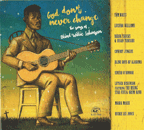 Various
artists
Various
artists
God Don’t Never Change: The Songs of Blind Willie Johnson
Alligator Records 2016
Did you know that “John the Revelator” wasn’t a song
by Son House? Or that “Keep Your Lamp Trimmed and Burning”
wasn’t Mississippi Fred McDowell’s (or Hot Tuna’s) creation?
Or that “Dark Was the Night” isn’t Ry Cooder’s
baby, either?
If so, you know of Blind Willie Johnson, the marvelous Texas bluesman
whose deeply inspirational gospel songs provided a seminal foundation
of Twentieth Century blues. Johnson was born in 1902, lost his sight somewhere
between the ages of seven and thirteen - depending on which legend one
believes - and died of pneumonia in 1947. His recording output was limited
to 30 songs captured on vinyl between 1927 and 1930, although he performed
in churches and on city streets before and after. Deeply religious, he
was a Baptist minister who infused his music with his soulful devotion.
Indisputably one of the finest slide guitarists in history, Johnson was
also an inimitable singer with a deep, raspy, powerful, and moving voice.
Attempts to emulate him are fated to pale in comparison, but kudos to
admirer and producer Jeffrey Gaskill, who gathered a distinguished group
of singers and accompanists to honor Johnson. The result is one of the
best tribute albums that I have ever heard.
Perhaps the least surprising participant is Tom Waits, whose gravelly
voice is appropriately congruent with Johnson’s originals. Waits
nails “The Soul of a Man” and “John the Revelator.”
The other vocalists on the CD don’t have the grit embodied in Johnson’s
legacy recordings, but they uniformly rise to the occasion with plenty
of emotion and conviction. Lucinda Williams performs splendid versions
of “It’s Nobody’s Fault but Mine” and the CD title
track, and the Blind Boys of Alabama apply their sonorous gospel harmonies
to “Mother’s Children Have a Hard Time.” Susan Tedeschi,
Maria McKee, Sinead O’Connor, and Margo Timmons with the Cowboy
Junkies all deliver outstanding renditions. Luther Dickinson brings an
accompanying fife to the proceedings, and Waits plays some cigar box banjo.
There is adept slide guitar on almost every track, highlighted by the
contributions of Derek Trucks and Doug Pettibone. Interestingly, there
are at least two instruments deployed on every number; Johnson himself
recorded only with his own guitar.
Liner notes, although provided in frustrating miniscule print, are also
excellent, delineating the efforts of each contributor and sporting a
long historical essay on Johnson by Michael Corcoran. This is an album
to savor, for its classic songs, the quality of its performances, and
for its inevitable stimulus to go back and listen to Johnson himself.—
Steve Daniels
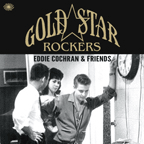 Gold
Star Rockers
Gold
Star Rockers
Eddie Cochran & Friends
Fantastic Voyage FVTD228 www.fantasticvoyagemusic.com
A fascinating, Dave Penny-curated, 3CD project that focuses on some fine
vintage rock ‘n’ roll recorded by pals of the legendary Eddie
Cochran, who, before he died in a car wreck at 21, not only had two million-sellers
(the smoochie! rockaballad “Sittin’ In The Balcony”
and the tortured “Summertime Blues”), appeared in three rock
‘n’ roll movies (including the must-see The Girl Can’t
Help It), was a talented guitarist as well as a gifted songwriter and,
particularly relevant here, spent a lot of time in the studio in an A&R
and arranger capacity. The ill-fated Cochran isn’t featured on all
the tracks here and a few weren’t even recorded at the historic
studio referenced in the compilation’s title, but the hundred-plus
selections all showcase performers with whom he enjoyed a close personal
and professional relationship during the late 1950s—including the
likes of Mamie Van Doren, Sam Butera, Hank Cochran (no relation), Johnny
Burnette, Gene Vincent and the Blue Caps, Jerry Capeheart and Troyce Key
among a host of less-familiars. All in all, a wittily campy, seen-from-within
aural commentary on teenage life in the 1950s as rockabilly was morphing
into rock ‘n’ roll. Take Gene Vincent’s sage advice
and “Git It!”—Gary von Tersch
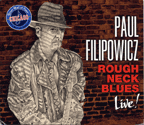 Paul
Filipowicz
Paul
Filipowicz
Rough Neck Blues Live!
Big Jake Records www.paulfilipowicz.com
He was raised in the ‘50s, closer to the prison in Joliet than the
south side of Chicago but fortunately the sounds of Otis Rush caught Paul’s
attention as a teen. He’s known the legends most bluesmen have only
listened to and learned from, he’s played with the likes of Hound
Dog Taylor and Mighty Joe Young while being schooled by Jimmy Dawkins.
His friend Luther Allison told Paul, “I know you’re a bluesman
and you know you’re a bluesman and every time you take the stage
you got to prove it,” and “Rough Neck Blues Live!” is
a testament to this advice. The tight combo filling the stage of the Knuckle
Down Saloon in Madison,Wisconsin has Rick Smith on bass, Brian ‘Tito’
Howard on drums and Benny Rickun blowin’ harp behind Paul’s
guitar and vocals. With more than thirty years fronting his own band this
isn’t his first live recording, and most of the eleven original
tunes have been recorded on other releases; these tried and blue licks
stand the test of time.
The hollow ambiance of the room fills the speakers as a rough hewn guitar
chops though, bending the strings to wring the opening lines of “Gambling
Woman” and “Most Dogs” both first recorded in 2001.
One of Paul’s earliest recorded tunes, “Black Spider,”
originally on his 1999 “What Have You Done For Me Lately,”
has Benny’s harp filling the holes in the web being woven as the
guitar howls through his “Santa Fe Windows” the only song
that’s not an encore recording. Pulling out his 2001 “Junk
In The Trunk,” Paul seems to catch fire, his fingers flying as if
over hot coals then cruising through the title tune from that CD “Midnight
At The Nairobi Room.” Invoking the ghost of Muddy, 2004’s
“Jackson Transfer” travels down years as Paul urges Benny
to hit the groove as the guitar sounds as if it’s strung with “Chickenwire,”
first on his the 2007 Live CD. Driving the set home with tunes from his
latest recording, “Your True Lovin,’” screams emotion
then slowly drawing us into “Hootin’ And Hollerin’”
with Benny’s harp leading Paul into the finale where they trade
licks and by the time these men have finished you definitely know “Where
The Blues Comes From.”
Filipowicz was inducted into “The Chicago Blues Hall Of Fame”
in 2015 and “Rough Neck Blues Live!” is evidence his South
Side influences have not been forgotten and are as strong as ever. —Roger
& Margaret White
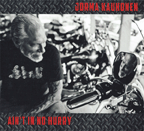 Jorma
Kaukonen
Jorma
Kaukonen
Ain’t in No Hurry
Red House Records 2015
If you aren’t familiar with Kaukonen, you have missed out on not
only some fine music, but a veritable history of Americana and roots music
personified.
As Jorma relates in the liner notes of this newest of his many albums,
the provenance of his music arises from his initial exposure to the Louvin
Brothers, the Carter Family, and other country music legends. Subsequent
exposure to blues icon Rev. Gary Davis was succeeded by visits to bluegrass
festivals, and Jorma’s move to the San Francisco area in the early
1960s threw him into the cauldron of burgeoning psychedelic rock. Soon
he was playing guitar for Janis Joplin, then co-founding the famed band
Jefferson Airplane, and subsequently co-founding the still extant duo
Hot Tuna, with friend and bassist Jack Casady, to maintain his love of
the blues.
In this, his third release for roots label Red House, Kaukonen again displays
the acoustic fingerstyle mastery that has earned him accolades for decades.
(Those of you who yearn for Jorma on fiery electric guitar, cue up your
old Airplane albums!) A slate of eleven tasteful tunes features Jorma
on vocals, with some skilled accompanists, including producer and multi-instrumentalist
Larry Campbell (who has also anchored many recent Bob Dylan tours). Casady
appears briefly, along with mandolinist Barry Mitterhof, and on several
cuts the dulcet harmony vocals of Campbell’s wife, Teresa Williams.
Myron Hart on bass and Justin Guip on drums provide solid backdrop.
Not properly classified as a blues album, this release is nonetheless
mighty bluesy. Of the eleven tracks, “Brother Can You Spare a Dime”
and the opener, “Nobody Knows You When You’re Down and Out”
most evoke the blues, the latter making me forget almost every other version
that I’ve heard. Most of the other songs, five composed by Jorma,
are more accurately labeled folk music.
Jorma’s singing, while slightly nasal and limited in range, is pleasing,
and his duets with Williams are excellent. Surprisingly, given the quality
of musicians involved, there is no instrumental, although the longest
track, “Bar Room Crystal Ball,” features less singing while
Jorma and colleagues dazzle on various strings. “Ain’t in
No Hurry” is not an album to dance to, get high to, or blast at
top volume. It is one fine disc to put on while ruminating, or just smiling
contentedly at the top-flight musicianship. This is warm summer night,
back porch music at its finest.— Steve Daniels
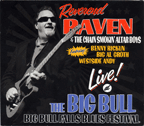 Reverend
Raven & The Chain Smokin’ Altar Boys
Reverend
Raven & The Chain Smokin’ Altar Boys
Live At The Big Bull
Nevermore Records
www.reverendraven.com
With some performers a live recording is the best way to catch their true
fire and Reverend Raven & The Chain Smokin’ Altar Boys are just
such an experience. The Reverend’s guitar playing is full of surprises,
squeezing that guitar to make it scream like a little girl or roar with
searing licks. The current stable of Altar Boys are PT Pederson bass,
Robert Lee Sellers drums, Danny Moore on keyboards and Westside Andy Linderman
or Benny Rickun blowing harp. They all claim to currently be non smokers
but with their aggressive and intense playing they do seem to be a little
on edge. Recorded “Live At The Big Bull” Falls Blues Festival,
Wisconsin’s longest running Blues Fest, it’s sliced and diced
from three different shows but you’d never know how this sausage
got made and that’s a testament to the bands consistency. So slide
this disc in and be ready for a ruckus, there’s not a dull spot
on these grooves.
The Rev shouts “hit it” as the band kicks into a pumping Earl
Hooker instrumental groove “Hot And Heavy,” the organ sweeps,
harp bleeps and you can feel the energy as the guitar burns it up. Gerry
Hundt’s modern classic “Walking To Chicago,” ain’t
no walk in the park for this band, Westside Andy’s solo and the
Rev’s guitar turns it into a playful romp. “You Didn’t
Even Say Goodbye” is a Reverend Raven original his big voice quivers
and the harp provides an echo to each line, when he calls out “put
some church in it” the organ comes in waves and the Rev’s
final stinging guitar solo invokes Otis Rush. Muddy Waters’ “She’s
Nineteen Years Old” has Andy blowing worthy of Little Walter as
Moore’s piano channels Spann while drummer Robert Lee Sellers takes
a swing at the vocals. On the original “My Life” Raven testifies
to his life changing salvation with the love of his life. Kicking into
night two at the Bull, Benny Rickun takes over the harp on Elmore James
“Hawaiian Boogie # 3” providing a faint echo on each ringing
slide line before stepping out front, and Bobby Rush’s “Chicken
Heads” is a full blown organ sashay. Finishing with tunes at Kochanski’s
Concertina they take Sleepy John Estes “Diving Duck Blues”
to a swinging spot and the Elmore slide slips back in for some “Stomping
& Shouting” finishing with Raven’s “Looking For
Love” a joyful romp that puts the fun back in love.
The Reverend Raven’s “Live At The Big Bull” is a testimonial
and you may feel the calling to pass some wine, whiskey or beer around
as a sacrament to your own ravin’.
Roger & Margaret White
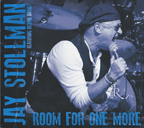 Jay
Stollman
Jay
Stollman
Room for One More
Number 7 Records 2015
Connecticut vocalist Stollman has teamed with guitar virtuoso Debbie Davies
and a talented crew of musicians to produce a blues rock album of high
quality.
Of the fourteen songs, Stollman composed five, but the album commences
with a cover of Walter Trout’s “Ride ‘Till I’m
Satisfied.” It’s followed by “I’m Done,”
a modified twelve-bar tune of Jay’s featuring Jeremy Goldsmith on
one of his two guitar leads on the CD. “Tired of Tryin’ “
is a Johnny Winter cover, giving space to Kevin Totoian to play some spirited
harmonica.
Pretty good so far, but the CD really takes off with “Lonesome in
My Bedroom.” (Composing credit is given to “Luther Johnson”;
it would be nice to know if this was “Guitar Junior,” “Snake
Boy,” “Houserocker,” or one of the other apparently
innumerable Luther Johnsons.) Stollman and Davies absolutely nail this
one; Debbie’s guitar lead is concise and dazzling without being
pretentious, she plays the right notes and not too many notes, and Jay
sings movingly. They mesh equally well as the tempo picks up on the ensuing
“I’d Rather Drink Muddy Water.” Kudos for next covering
Sam Cooke’s “A Change Is Gonna Come”; Cooke, like Aretha
Franklin, Ray Charles, and a few other inimitable singers, is hard to
match, but Stollman’s raspy and rangy rendition is impressive.
Other fine tracks include “Back to Memphis,” a Chuck Berry
song in which Stollman’s and Davies’ exemplary efforts are
abetted by some zingy piano by Matt Zeiner. On subsequent tracks Andy
Abel adds deft guitar, including slide on “Love Me & Leave Me,”
which also features more Davies killer contribution. The album closes
with a final Stollman composition, the slow title tune, with Abel’s
slide accompaniment and a country blues aura.
Stollman has undeniable vocal chops, and his pairing with Davies is an
fine collaboration.— Steve Daniels
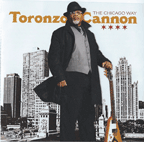 Toronzo
Cannon
Toronzo
Cannon
The Chicago Way
Alligator Records 2016
This CD by Chicago-born and -based Toronzo Cannon had me from the first
track; in fact from the first twenty seconds. “The Pain Around Me”
begins with a series of chugging guitar chords and segues into a lyrical
lead, bolstered by the sturdy rhythm section of Larry Williams on bass
and “Pookie Stix” Carlisle on drums. Fifty-two minutes later,
all I wanted to do was play the CD again.
Originally drawn to reggae in an indisputable city of blues, Cannon soon
gravitated to our favorite genre. After serving as a sideman for years,
he formed his own band about 15 years ago and hasn’t looked back.
This, his fourth album and first for Alligator, and an appearance on the
January 2016 Legendary Rhythm & Blues Cruise, have cemented his burgeoning
reputation as a powerful figure in contemporary blues.
Cannon has a unique guitar style, at once forceful and lyrical. Although
he grew up watching Buddy Guy and Magic Slim, and also cites J.B. Hutto,
Albert King, and Jimi Hendrix as influences, he only sounds like himself.
You might hear a few bars of lead that remind you of Jimi, Son Seals,
or Michael Burks, but then Cannon segues into his own infectious groove.
Most notably, he doesn’t attempt to overwhelm with flashy or frenetic
fretwork; rather, he tailors his leads to the needs of the songs.
Speaking of which…Cannon composed all eleven numbers, which are
uniformly fine. As co-producer Bruce Iglauer proclaims in the liner notes,
Cannon’s songs are “inspired by his Chicago upbringing, his
years observing the public while working as a city bus driver...and his
own battles and triumphs.” Thus we have the opening tune, a lament
for the insecurity and sordidness of inner city life, followed by the
ruefully humorous chronicle of entrapment in a “Bad Contract,”
succeeded by the resolve to face up to life’s unavoidable vicissitudes
and challenges in “Walk It Off.” Other songs extol the glories
of a lover, describe the travails of a “Midlife Crisis,” and
decry the frustrations of having an unattainable paramour. The album concludes
with “I Am,” a sustained declaration of multiple conflicting
personalities contained in an individual and a city.
Throughout, Brother John Kattke provides strong keyboard support, and
several tracks are augmented by horns and background vocals. Cannon’s
singing rocks and croons in exemplary fashion.
Featuring excellent musicianship and refreshingly original songs, this
album is already on my short list as one of the best of 2016. Excuse me
now while I go listen to it again.— Steve Daniels
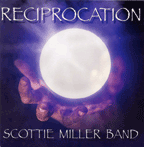 Scottie
Miller Band
Scottie
Miller Band
Reciprocation
scottiemiller.com
Keyboard ace Scottie Miller has achieved national attention touring with
Ruthie Foster for eight years but he’s now stepped into the spotlight
on his own with “Reciprocation.” Scottie has stepped to the
front in all regards penning all the songs as well as producing. His band
has heavily influenced this record featuring the rhythm section of Mark
O’Day drums, Dik Shopteau bass and Patrick Allen on guitar giving
this CD a full blues/rock sound. Scottie was inducted into the Minnesota
Blues Hall of Fame before his stint with Ms Foster so this new offering
has been a long time coming.
A southern soul-inflected vocal over waves of organ ushers in “Where
You Been Hiding?” the tension builds as electric piano and wailing
guitar fill the solos. “Bring It On” has a light reggae beat
with Miller’s vocals taking on a Boz Scaggs tone and “Keep
On Walking” has a loping rhythm and message of hope as the sweeping
organ comes in like a ray of sunshine bursting through as Miller’s
vocals take flight. “Nothing Can Stop Us” features a crushing
rock riff competing with a lighter vocal chorus echoed on piano while
on “Selfish” the guitar takes a forceful stance against vocals
sweetened by backing vocals. The title tune “Reciprocation”
has an early Santana flair with a driving rhythm and soaring guitar but
it’s Scottie’s B3 organ fills that lock in that vibe. A gentle
folk quality sets things up till “Wreckage” breaks out into
pandemonium with brutal guitar riffs and Miller’s vocals rise above
the turmoil. A sloppy guitar and laid back Fender Rhodes weave through
a slaphappy tale of “Too Far Gone” till they sober up with
stunning solos before turning into the mean drunk of “Get Some.”
A bluesy piano that feels like NRBQ leads “I’ve Been Made”
into a tale of drug induced paranoia that rolls into a ZZ Top riff with
a tough pleading vocal wail echoed by guitar on “Walk A Mile.”
“Gold Dust” has a Mexican themed accordion weaving through
Miller’s voice sounding like the Eagles’ Don Henley and “Revelation”
ain’t just a biblical term this heavy groove shows it’s there
if you just look deep inside yourself.
Scottie Miller has been a stunning side man and his new CD “Reciprocation”
has taken that title to heart, turning his talents inward and giving back
straight from the heart. —Roger & Margaret White
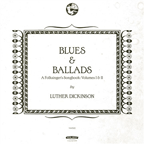 Luther
Dickinson
Luther
Dickinson
Blues & Ballads:
A Folksingers Songbook: Volumes I & II
New West CD NewWestRecords.com
This ambitious project, also available as a vinyl album, features 21 tunes
from throughout Memphis-based Dickinson’s lengthy career that, taken
collectively, vividly celebrate and earnestly carry on the rural South’s
hill country blues tradition—heavily autobiographical new songs,
songs he penned with his rock & roll band the North Mississippi Allstars,
songs he picked up from friends and family, songs passed down to him by
his heroes and mentors and songs that have survived just below the surface
of the American subconscious, roiling and coiling, for generations—all
proffered simply, in stripped down fashion (just voice, guitar, drums,
some blues fife and sprinkles of Beale Street piano) with guest shots
by the likes of Jason Isbell, Jim Lauderdale, JJ Grey (on the sprightly
walking blues “Up Over Yonder”), Jimbo Mathus, fife-and-drum
master Othar Turner’s granddaughter, Sharde Thomas, and mighty Mavis
Staples—on “Ain’t No Grave,” which Luther wrote
after the death of his music maverick father, Jim Dickinson. Other favorites
around my house include the haunting “Let It Roll,” the seemingly
apparitional “Moonshine,” a rock & rolling “Mayor
Langford Birmingham Blues” and the John Lee Hooker-sounding “Shake
(Yo Mama).” All killer, no filler.—Gary von Tersch
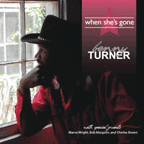 Benny
Turner
Benny
Turner
When She’s Gone
NOLA
Benny Turner is a class act. Steeped in blues history he writes songs
that reflect the struggles of relationships, as well as the joys. Six
of the 10 songs herein were written and recorded for his under-promoted
1997 debut disc, “Blue and Not So Blue.” The opener, I Can’t
Leave, is as good as it gets, both lyrically and vocally. When he sings,
“I work two jobs/put that money in your hand/and you give every
dime/to your back door man/I can’t leave/I’m gonna buy me
a long .44/I’m gonna wait by the back door/when I get him in my
sights/he won’t be comin’ ‘round no more” you
know this is a man in a jam. Like many of the older tunes on the collection,
there is no guitar. Benny’s big brother Freddie King was one of
the great guitarist of the blues idiom and that’s just too tough
of an act to follow. His Pity On This Lovesick Fool sees him play his
preferred instrument, the bass. It also features a duet with the late
great Marva Wright, with whom Benny toured the world for 20 years as her
bandleader. The funky Fender Rhodes work of Samuel ‘The Bishop’
Berfect frames the tune. “I woke up this morning/I heard my back
door slam/I looked out my window/that’s when my troubles began/she
yelled back on me/I’m leaving for another man.” Poor Benny
may be a lovesick fool, but he also is having trouble picking the right
woman. Because of You breaks the no-guitar rule. Dr. John asked to play
guitar on the tune and how could Benny say no? A beautiful classic New
Orleans ballad, he sings “because of you/I can feel sweet life again.”
Sweet piano and sweeter vocals inform the song. His version of the Bill
Withers’ classic Ain’t No Sunshine, recorded in 2015, features
Bob Margolin on lead and Derwin ‘Big D’ Perkins on rhythm
guitar. Benny sings this very close to the original, which is to say it’s
a beautiful rendition.
The next three tunes are also from 1997. So Deep is special for its inclusion
of the great Charles Brown on piano. This was one of the legend’s
last dates and this is the first appearance of this landmark recording.
Benny and his brother Freddie used to rush home as kids to listen to Charles
on the radio and it was a major deal for Benny to record with a hero.
His bass work in the intro is a knock out and his vocals are more so.
If I Can’t Have You is a straight up medium tempo love song that
benefits from Berfect’s B3. Have You Ever Been So Lonesome reminds
a bit (just a bit) of Freddie King’s Have You Ever Loved A Woman?
It’s emotive and deep-from-the-heart gorgeous. Again, the solo that
Benny plays on bass is highly impressive.
The final three are from 2015 and are covers of classics that affected
who Benny Turner became musically. On Reconsider Baby Margolin again plays
guitar. Benny’s vocals are exquisite and dead-on. That’s Alright
I’ll Get Over You is the Jimmy Roger’s classic. Benny spent
many formative years in Chicago and got an up close look at the masters
coming up. On this version he plays guitar, as well as bass. Black Night
also spotlights the great Charles Brown on a classic from his book. Benny
Turner is a class act, to be sure. Last year’s Journey album was
one of the year’s best. Put this in that same camp. Stellar. —Mark
E. Gallo
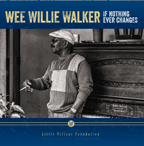 Wee
Willie Walker
Wee
Willie Walker
If Nothing Ever Changes
Little Village Foundation
The Little Village Foundation is a project launched by Jim Pugh, Kid Anderson,
and Rick Estrin to right some wrongs that history had brought to classic
artists that were overlooked and who clearly deserve another listen. Wee
Willie Walker is one of the first artists to get that treatment from these
music fans. In the liner notes Rick Estrin writes, “Here was a classic
Soul singer, with vocal artistry comparable to greats like Sam Cooke,
Wilson Pickett, Solomon Burke, or Johnnie Taylor.” A pretty heady
endorsement, to be sure. As it turns out, no surprise, Willie Walker is
all of that. The opener, Eddie Hinton’s Read Between The Lines opens
with a mighty horn clarion call before Willie breaks in with a rhythmic
vocal that tells the story of his woman running round on him. Pugh’s
piano, Randy Bermudes’ electric bass, and J. Hansen’s drums
drive the rhythm. Curtis Salgado stops in to guest duet on a brilliant
version of the Lennon-McCartney tune Help. This version drips with bluesy
soul, with a gospel backdrop replete with choir-like vocals, killer organ
and that amazing horn section. On Everybody Meets Mr. Blue Walker he channels
Otis Redding. The standout piece on the set for these ears is the Cindy
Walker (no relation) number, Not That I Care. Reminiscent of the country
classic I Really Don’t Want To Know, it’s a gorgeous country
love song that sounds like two steps from Willie crying in his beer. Is
That It, an Estrin-penned number, has a classic organ trio groove over
which Wee Willie Walker adds gritty gut wrenching vocals (“did I
do something wrong?/is that it?/or is it just the thrill is gone?/is that
it?”) and Nancy Wright blows a fat tenor solo. I Don’t Remember
Loving You again reminds of the sass and the power of classic Otis Redding.
Estrin’s What Love Can Do and, especially, the Estrin-Anderson piece
Hands of Time, reminiscent of High Heeled Sneakers, both harken back to
the 1960s. When Walker sings “I’m gonna let the hands of time/
baby put you in your place/gonna get just what you got comin’/when
they smack you in your face” you know he’s got payback on
his mind.
The musicians on the date are first rate, too. In addition to those mentioned
above, Kid Anderson plays guitars and electronics, and the date was recorded
at his Greaseland Studios. Bob Welch plays guitar and keys, Rusty Zinn
is on guitar. Saxophonists are Terry Hanck, Nancy Wright, Frankie Ramos,
and Eric Spaulding. The trumpets are John Halblieb, Manny Angel, and Tom
Poole. Farris Jarrah plays trombone, Nate Ginsberg plays piano on the
title cut, Lorenzo Farrell plays the Moog on Hymn For the Lonely Hearts,
Rick Estrin plays harp on Funky Way, backing vocals are courtesy of Lisa
Leuschner Anderson, Donnie Woodruff, Will Russ, and Dennis Dove, and strings
on What Love Can Do are played by Timba Harris (violin), Don Daily (viola),
and Nicci Welch (cello).
This isn’t Willie’s initial foray into music. He recorded
for Chess and Goldwax in the late 60s and has released half a dozen albums
since then. This will hopefully be an album that helps break him into
greater recognition. This is the real deal. Fantastic. —Mark E.
Gallo
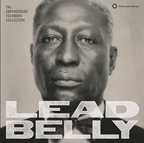 Leadbelly
Leadbelly
The Smithsonian Folkways Collection
Smithsonian Folkways
Leadbelly was born Huddie Ledbetter in Mooringsport, Louisiana in 1888
into a family that included musicians from whom he picked up the basics
of playing guitar and accordion for dances and weekend street amusement.
The outside world became aware of his talents when, in the early Thirties,
folklorist John A. Lomax visited Angola Penitentiary collecting prison
songs and discovered his wide repertoire of traditional music. For the
following two decades Leadbelly recorded a cornucopia of blues, ballads,
dance songs and various other examples of black folk music, accompanied
by his world-weary vocals and thrusting 12-string Stella guitar—including
many bygone songs of the pre-blues era like “The Midnight Special,”
“Rock Island Line,” “Ella Speed, “Irene”
and “Pick A Bale Of Cotton”—that became standards of
the Fifties folk revival as well as Britain’s lively skiffle movement.
Although effusively acclaimed by both the folk music establishment and
society audiences, he died in relative poverty in 1949. This long overdue,
lavishly-produced project features five discs, with 108 tracks (sixteen
hitherto unreleased, including a rare 1941 radio broadcast), tucked into
a large-format 140-page hardcover book that contains a boatload of historic
photos, numerous essays, reproduced handbills, a full discography and
extensive notes. Leadbelly’s tumble-down hollers and 12-string acoustic
guitar playing became not only cornerstones of American folk music but
touchstones of this country’s African American cultural legacy.
Worth the price.—Gary von Tersch
 Johnny
Rawls
Johnny
Rawls
Tiger In A Cage
Catfood Records
Johnny Rawls is steeped in the Southern blues tradition. Soulful and elegant.
Classic and contemporary. Embellished by soulful backing vocals, punchy,
sassy horn charts, and lush strings. He sings of love lost and love found,
partying, and sex – just the usual suspects, ma’am. He opens
the set, however, with a slice of urban reality on the powerful title
cut. “Like a Tiger locked in a cage/filled with hate/filled with
rage/learn a hard lesson in the college of crime/19 years old doing hard
time/lock him away/lock him up tight/lock him away/ keep him out of sight/lock
him away and throw away the key/when he gets out/what will he be?”
The following cut, Born to the Blues, sits at the top of the Soul Blues
charts at the time of this writing, with Tiger In A Cage at #2. Pretty
impressive, to be sure, but run-of-the-mill for our hero. An impressive
guitarist, as a rule, he sticks with singing and writing a slew of impressive
songs for this outing. Johnny McGhee is the guitarist and he’s brilliant.
Johnny Rawls sings over the band, the Rays, “40 years I’m
still going strong/I got to keep on keeping on/cause when life gets me
down/I never stay down for long/I was born to this life.” The Rays
sound like the Stax house band on their reprise of Johnny’s Red
Cadillac. The horns — Andy Roman (alto and tenor), Mike Middleton
(trumpet), Robert Claiborne (trombone), and Nick Flood (baritone) –
are bright and crisp, Bob Trenchard (bass) and Richy Puga (drums) own
the pocket and Dan Ferguson’s keys add color and spunky funk. McGhee
is knock-down impressive. This is a dream band and Rawls gives them room
to do their magic throughout.
Keep It Loose (“I’ll pick you up about half past nine/head
to the juke joint on the county line”), duetting with Eden Brent
on the Cajun-groove of Southern Honey (“you can make your move/and
spend your money/you ain’t getting’ none of this southern
honey”), and the sweet I Would Be Nothing (“you are the sunshine
of my life/you make my dark clouds go away”) all speak to the journeyman
writing skills of Rawls. The few covers on the program are well chosen
and given brilliant readings, as well. The take on Sam Cooke’s Having
A Party benefits from the easy laid back vocals from Arlen, Jessica and
Jillian Ivey. The horns shine on his version of the Jackie Wilson standard
Higher and Higher. The standout of the trio is the take on Beast of Burden.
McGhee is simmering, the Iveys add backing vocals in perfect unison, and
those horns, again, are spectacular. Johnny Rawls makes the song his own.
This is the work of a first rate soulful blues man. Highly recommended.
—Mark E. Gallo
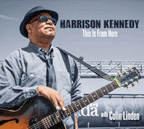 Harrison
Kennedy
Harrison
Kennedy
This Is From Here
Electro-Fi
Canada has a very active blues scene that just doesn’t get the respect
it deserves. Harrison Kennedy, out of Hamilton, Ontario, is a case in
point. When he was a young man he travelled with a 12- member group of
musician friends to Detroit. While there he was recruited by Holland-Dozier-Holland
to form a new band, Chairmen of The Board, to record for their new label,
Invictus. In short order they had a hit with Give Me Just A Little More
Time and they toured the world in the late 60s. Flash forward to 2016.
In the interim Kennedy has been nominated for Juno awards a number of
times and he finished second in the 2011 International Blues Challenge.
Surrounding himself with a crew of front line Canadian artists –
Colin Linden on guitar, bassist John Dymond (from kd lang’s band),
drummer Gary Craig (Bruce Cockburn’s band), pianist Jesse O’Brien,
guitarists Chris Caddell and Brian Griffin, and bassist Terry Wilkins,
Kennedy presents a program of mostly original, mostly country style blues.
Despite the photo on the cover of him holding a nice looking Gibson, he
doesn’t play. He sings. His vocals are mesmerizing. A little raspy,
deep and wholly expressive. Colin Linden’s guitar is sinewy and
elastic, a perfect foil to Kennedy. From the country of Walkin’
Or Ridin’ (“She’s like a Tiger/always on the prowl/I
never know/who she’s stalkin’ now”) to the gospel feel
of Shake the Hand (“come shake the hand/shake the hand that shook
the earth”) to the deep piano blues of Jimmy Lee, this is one of
the standout recordings of the year. Can’t Let Go is one of the
standout tunes on the set (“You know that when we met/my luck had
just run out/but you waited patiently/that’s what love’s about”).
Snapping drums, rolling piano and subtle guitar.
Friday Dreams is a rocker about weekend anticipation, You, Me Or Us is
a ballad that touches the heart, and Judgment Day is a little bit over
one minute of vocals, spoons and harmonica, all from Kennedy. He’s
certainly no one-horse groovester. His Crocodile Lies is a piano rockin’
number that opines that “somebody’s got to go.” His
take on the Ray Charles hit I’ve Got News For You is given an appropriately
bluesy reading that pays tribute to Ray and induces smiles at 50 feet.
Great stuff. He does a rollicking Milk Cow Blues, credited to him (hmm).
Brian Griffin plays superb guitar and O’Brien dazzles. On the vocal
scale Harrison Kennedy falls somewhere between Johnny Adams and Otis Taylor,
but clearly is his own man. And just as clearly, a formidable singer to
keep an ear out for. If Canada needs a Blues Ambassador, look no further
than this fantastic singer.— Mark E. Gallo
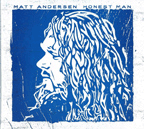 Matt
Andersen
Matt
Andersen
Honest Man
Stubbyfingers Incorporated 2016
Matt Andersen, from New Brunswick in northeast Canada, was the 2010 International
Blues Challenge winner in the solo/duo category. This is his ninth album;
four of them preceded his IBC victory, and he has been a lauded Canadian
artist for a decade. He has won Canadian Juno and Maple Blues Awards and
the European Blues Award in 2013. For those of us fortunate enough to
have seen Andersen rip through blazing solo sets on several Legendary
Rhythm & Blues Cruises, it may be a surprise that he is equally comfortable
in a band setting, as evidenced by this album (as well as others).
In fact, the liner notes credit no less than nineteen accompanying musicians
and vocalists, but Andersen is without a doubt the focus; his singing,
to be exact, is the cynosure. What a set of pipes this man has! Andersen
is blessed with a lyrically mellow and simultaneously majestically powerful
voice, and he is able to produce a pitch perfect and preternaturally prolonged
note, and in the next moment segue into some wondrous melisma.
All ten songs on the album are penned by Matt; generally slow or mid-tempo,
they are of high quality. Most are not specifically blues songs, more
properly assigned to the folk or Americana genre. (Canadians are [North]
Americans, after all.) The title track hews closest to the classic twelve-bar
format, but the prevailing themes of the songs stick to timeworn blues
tropes of travail, blissful or unrequited love, betrayal, and nostalgia.
Standouts include “Last Surrender,” a moving love ballad,
and the following “Who Are You Listening To?” an irresistible
rocker.
The only caveat is that Andersen’s monstrous acoustic guitar skills
are barely to be heard. His live solo appearances feature him attacking
his guitar with a dexterous ferocity that is jaw-dropping. How the guitar
survives is a puzzle. Perhaps he just decided to give his axe a rest.
On this album, his voice suffices.— Steve Daniels
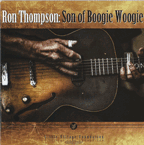 Ron
Thompson
Ron
Thompson
Son of Boogie Woogie
Little Village Foundation 2015
Welcome back! Ron Thompson. The wait for your first album in almost ten
years was worth it.
For those residing outside the San Francisco Bay Area, Thompson’s
name may be unfamiliar. An Oakland native, Thompson has been a mainstay
of Bay Area blues since the 1970s, with an impressive resume. He has worked
with innumerable legends, including Etta James, Big Mama Thornton, and
Lowell Fulson, and for almost a decade was guitarist and bandleader for
John Lee Hooker. For many years he led The Resistors, a band renowned
for its frenetic, stentorian, no-holds-barred performances. Yet despite
his skills on guitar, harmonica, and piano, and his stellar history, Thompson
never achieved widespread acclaim.
Former long-time Robert Cray keyboardist Jim Pugh has grabbed Thompson
for his new Little Village label, and the man has produced the goods.
Under the guiding hand of busy producer Kid Andersen, this CD sports a
round dozen songs showcasing Thompson doing what he does best, which is
honoring urban blues with his unpretentious, gritty delivery. Backed only
by Pugh on keyboards and alternating drummers D’mar and Scott Griffin,
Thompson digs in deeply.
Although several songs are obvious covers, composing credits are not given
on any, except “Sugar Bee,” a tune from Cleveland Crochet.
(Yes, Crochet was a real person: a white Louisiana fiddle player for The
Hillbilly Ramblers who recorded the tune in 1961 and died in 2011.) It’s
easy to identify the provenance of “Standing at the Crossroads,”
though; it’s a rocked-up version of Robert Johnson’s classic
“Crossroad Blues,” at a tempo between Johnson’s original
and the near-psychedelic rendition by Eric Clapton and Cream. Thompson’s
slide offerings are excellent, as they are throughout the set; for more
evidence, check out “Show Biz Blues,” another mid-tempo track
evoking memories of great slide players J.B. Hutto, Hound Dog Taylor,
and Lil Ed Williams. Like those three, Thompson eschews subtlety in favor
of undiluted power and emotion.
Other standouts includes the Jimmy Reed cover “Too Late Brother”
and the title cut, a brief two minute outing in homage to John Lee Hooker
in which Ron and colleagues capture Hooker’s groove admirably. Not
least, “Telephone Blues,” the longest track on the album at
over eight minutes (of a near hour total), displays Thompson’s facility
at slow, evocative, single note guitar leads.
Pugh’s keyboard offerings should be acknowledged. (Thompson doesn’t
play the piano on this release.) His deft and sophisticated style, so
appropriate for his recently ended quarter century stint with the Robert
Cray Band, occasionally clashes with Thompson’s consistently more
gut-bucket delivery, but on other tracks they mesh seamlessly and pleasingly.
The overall result is a compelling album confirming Thompson’s authentic
and pithy blues credentials.— Steve Daniels
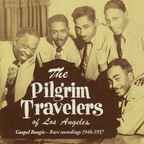 The
Pilgrim Travelers
The
Pilgrim Travelers
Gospel Boogie Rare Recordings 1946-57
Gospel Friend CD (PN-1510) www.gospelfriend.com
The Pilgrim Travelers were among the most commercially successful and
influential groups of gospel’s Golden Age. Noted for their unique
and decidedly hypnotic “walking rhythm” approach, they also
had a reputation for tumultuously “wrecking churches” with
their emotionally arousing aural vocal interplay as they all had magnificent
voices—particularly Kylo Turner and Keith Barber, who occasionally
“switched leads” to great effect. As project producer and
insightful liners author Per Notini puts it: “Along with the Soul
Stirrers and the Five Blind Boys of Mississippi, the Pilgrim Travelers
were the hardest working, best-dressed, farthest traveling and most recorded
male quartet on the gospel highway, winning acclaim and fame by singing
with a fervor and power hardly heard before.” Mostly culled from
sides cut for Art Rupe’s Los Angeles-based Specialty label, this
great-sounding 27 track collection features 16 selections making their
CD debut as it traces the group from their first studio sides in 1946
(recorded by the legendary Bob Geddins in Berkeley, California) through
their particularly fruitful period with Specialty and closes with eight
sides, from 1955 through 1957, released on Andex (a gospel offshoot of
Keen Records) as the glory days are beginning to fade with the departure
of both Turner and Barber. It’s hard to select favorite tracks since
they’re all riveting but I am especially fond of the four Geddins
efforts (especially “When They Ring Them Golden Bells” and
“Jezebel”) as well as “Grow Closer”(where Brother
Joe May guests on lead) and the soulfully passionate “How Jesus
Died,” that Ray Charles re-titled “Lonely Avenue.” Worth
searching out.—Gary von Tersch
Blues Books
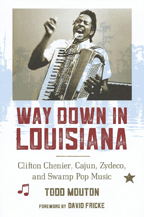 Way
Down In Louisiana:
Way
Down In Louisiana:
Clifton Chenier, Cajun, Zydeco and Swamp Pop Music
By Todd Mouton
University Of Louisiana At
Lafayette Press
Blues accordion ace and musical alchemist, Clifton Chenier, was also born
in the Pelican State—on a sharecropping farm near Opelousas in June,
1925. In Way Down In Louisiana, journalist, record and event producer
and (most importantly) native son himself, Todd Mouton, uses the life
and times of the charismatic “King of the Zydeco” Clifton
Chenier and his Red Hot Louisiana Band as the centerpiece for an inter-connected
series of chapters that profile a host of his fellow musical innovators
and acolytes in the Cajun, Zydeco and Swamp Pop idioms. “Zydeco”
being basically the equivalent of Cajun music found among the French-speaking
blacks of the Texas and Louisiana Gulf Coasts, with the accordion replacing
the fiddle. Full chapters are devoted to the preservationist likes of
Buckwheat Zydeco, Sonny Landreth, BeauSoleil, Steve Riley & The Mamou
Playboys and Zachary Richard among others. In the Fifties, Chenier’s
hybrid, butt-rockin’ sound had scattered commercial success on independents
like Specialty, Checker, Zynn and Elko but his big breakthrough came in
Houston in the early Sixties when Lightnin’ Hopkins took Arhoolie
Records’ Chris Strachwitz to “a tiny beer joint down near
the ship channels to hear his wife’s cousin—there was Clifton
and his accordion, with just a drummer backing him, and he was wailing
Cajun blues like I had never heard before.” The very next day big-eared
Strachwitz had Clifton and his rubboard-playing older brother, Cleveland,
in a Houston recording studio and the rest is history. Chenier ended up
recording extensively for Arhoolie and Strachwitz goes into insightful
detail about each album. Spread throughout the book are 130 vivid historic
images by two dozen photographers along with chapter-by-chapter suggested
playlists. Very recommended.—Gary von Tersch
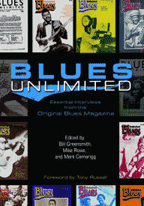 Blues
Unlimited:
Blues
Unlimited:
Essential Interviews From The Original Blues Magazine
Edited by Bill Greensmith,
Mike Rowe and Mark Camarigg
University of Illinois Press www.press.uillinois.edu
Blues Unlimited, for you youngsters out there, was the first publication
devoted solely to the blues. It was originally headquartered in the attic
above co-founder Simon Napiers’ parents’ antique shop in a
sleepy seaside town in East Sussex called Bexhill-on-Sea. Issue number
one from April 1963 had a print run of only 180 copies and sold out quickly
(features included articles on Little Junior Parker and Crown Records)
and, as the then-nascent, now-legendary blues revival hastily took off,
researchers, discographers and blues hounds from Europe and the United
States began to freely link up with each other, heightening the edification
of blues fans as it reported the latest news and life stories of innumerable
musicians and set the standard for graphic, extended interviews. Along
with record reviews—the first album reviews yours truly ever wrote
were for BU Co-founder Mike Leadbitter and I also traded numerous letters
back and forth. Shockingly, however, discographical maven Leadbitter died
of meningitis in November, 1974 at the age of 32. Napier and various devotees
carried on in the magazine’s informative fashion until issue 148/149
in the winter of 1987 when numerous problems spelled the end. Most issues
contained groundbreaking artist interviews and a covey of the most enlightening
are collected here (along with a gang of photos) over the volume’s
generous 496 pages. Moving from Chicago and the likes of Freddie King,
James Cotton, Fred Below and the Old Swing-Masters (Moody Jones, Floyd
Jones and Snooky Pryor) to Detroit’s Baby Boy Warren, Big Maceo,
Walter Mitchell and LC Green, to St. Louis (with Jimmy Thomas, Joe Dean,
the Sparks Brothers and Fontella Bass), to Mississippi (Arthur “Big
Boy” Crudup and Louise Johnson), to Texas (Juke Boy Bonner, Dr.
Hepcat and Albert Collins), to the West Coast (with Johnny Otis and Roy
Brown) and closing with a couple of big-eared “record men”—Henry
Glover and Chess Records’ Ralph Bass. As the press flyer puts it:
“Here are eyewitness accounts of the blues written in neon lights
and tears, an American epic of struggle and transcendence, of Saturday
night triumphs and Sunday morning obscurity, of clean picking and dirty
deals.” I couldn’t agree more. A necessary purchase.—Gary
von Tersch
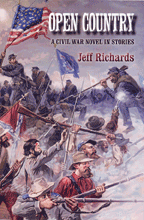 Open
Country:
Open
Country:
A Civil War Novel in Stories
By Jeff Richards
Paycock Press
www.gargoylemagazine.com
As we delve into our next election cycle this nation is in turmoil, economic
differences and debate over states’ rights have divided the county,
pitting families and communities against each other. This has happened
before with disastrous results more then 150 years ago during the course
of the Civil War. “Open Country” transports you back to this
time developed through a cast of interrelated characters, farmers, tradesmen,
wives, daughters, lovers, neighbors and slaves whose lives cross paths
in battle or as they went about their day to day lives. The story unfolds
as battles are within walking distance, fought across farm fields where
the enemy line are within yards, seeing friends killed while wife’s
kept the home fires burning listening to the canon and rifle fire as the
smell of battle lingers in the air. This novel doesn’t go into graphic
battle strategy but gives the reader a sense of the character of the men
and women who were living through this period with the use of period language,
colorful details of wardrobe and uniforms or the lack there of and graphic
descriptions of the smells, sounds and music. The men sought distractions
from the daily carnage by turned a string of baling wire into a diddley
bow, pulling out a harmonica or banjo from their sack even salvaging a
piano from a burning home. Through all the trials and tribulations of
the war it’s the songs and the music that carried them through the
days and nights and years. As the war dragged on they sat around campfires
singing hymns and songs of the day like “Home Sweet Home,”
“Dixie,” “Swing Low Sweet Chariot,” “My
Old Kentucky Home,” “Midnight Special” and “Boll
Weevil Blues.”
The North may have won the war but it was the blues that captured the
hearts and souls of the country.—Roger & Margaret White
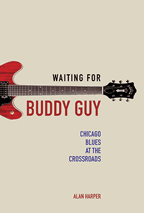 Waiting
For Buddy Guy:
Waiting
For Buddy Guy:
Chicago Blues At The Crossroads
By Alan Harper
University Of Illinois Press
1325 South Oak Street Champaign, IL 61820-6903
With only a little embellishing on my part, veteran Chicago bluesman Billy
Branch personalizes his back-cover commentary concerning British blues
fan Alan Harper’s absorbingly reflective book thusly: “Harper
has provided a painstakingly detailed glimpse into an almost forgotten
era of the authentic Chicago blues scene that was still somewhat flourishing
in the late 1970s and early 1980s. Reading this book filled in some personal
lapses of memory, reminding me of the wonderful moments that I shared
with some of the greatest musicians that I’ve ever known.”
Indeed, Harper’s 232 page memoir vividly evokes the begrimed bastions
of men like Branch, pianist Sunnyland Slim, harmonica aces Big Walter
and Carey Bell and guitarist Louis Myers (and his white 1973 Cadillac
Eldorado convertible with red leather upholstery) among many others. From
backstage dressing rooms, various clubs, kitchen tables and living rooms,
as well as the shotgun seat of that 1973 Eldorado, the ever-perceptive
and intrepid Harper listens to performers, record label owners (primarily
Delmark’s Bob Koester), club owners, promoters, disc jockeys and
insightful bar patrons among others to chronicle memories of deserved
success and chances forever missed, of deep wells of soul-pain and skyrocketing
flights of revelation. Harper also documents an era of transition as a
more deeply rhythmic, whites-welcoming, guitar-to-the-fore brand of blues
eclipsed what had preceded it and elderly, Southern-born black performers
“held court” one final time before a new generation of young
guitar aces supplanted them. Harper tells the story with a lively anecdotal
flair that ropes the reader in from the first few pages with a wealth
of fond memories for those, like me, that were on the scene (from the
vantage point of the West Coast) at the time. 45 candid black and white
Harper photographs add faces to the storytellers. Very recommended.—Gary
von Tersche
Home
/ Blues Blogs /
Artist Links / Blues
Links / Videos / Store
Subscribe / Advertise
/ Back Issues
/ Contact / Staff